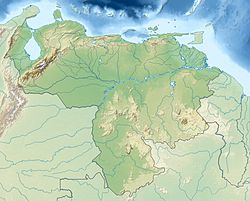Yuruaní-tepui: Difference between revisions
Appearance
Content deleted Content added
Citation bot (talk | contribs) Misc citation tidying. | Use this bot. Report bugs. | Suggested by AManWithNoPlan | #UCB_CommandLine |
Eastern portion of Yuruaní-tepui Tag: Reverted |
||
| Line 23: | Line 23: | ||
}} |
}} |
||
'''Yuruaní-tepui''', also known by the [[Pemon language|Pemón]] name '''Iwalkarima''', '''Iwalecalima'''<ref>{{in lang|es}} Brewer-Carías, C. (2012). {{cite web |
'''Yuruaní-tepui''', also known by the [[Pemon language|Pemón]] name '''Iwalkarima''', '''Iwalecalima'''<ref>{{in lang|es}} Brewer-Carías, C. (2012). {{cite web|url= http://www.plymouth.ac.uk/files/extranet/docs/I_UBC/RORAIMA_Madre_de_todos_los_rios.pdf |title=Roraima: madre de todos los ríos. }} ''Río Verde'' '''8''': 77–94.</ref> or '''Iwarkárima''',<ref>{{in lang|es}} [http://www.explorandorutas.com/tepuy.html El Tepuy - Características de los Tepuyes] {{webarchive |url=https://web.archive.org/web/20130120003150/http://www.explorandorutas.com/tepuy.html |date=January 20, 2013 }}. ExplorandoRutas.com.</ref> is a [[tepui]] of the [[Eastern Tepuis]] chain primarily situated in [[Venezuela]], while part of the eastern ridge stretches across the border with [[Guyana]] and into the [[Guayana Esequiba]] region.<ref name=intro>Huber, O. (1995). Geographical and physical features. In: P.E. Berry, B.K. Holst & K. Yatskievych (eds.) ''[[Flora of the Venezuelan Guayana|Flora of the Venezuelan Guayana. Volume 1. Introduction.]]'' Missouri Botanical Garden Press, St. Louis. pp. 1–61.</ref> It has an elevation of around {{convert|2400|m|ft|sigfig=2}}, the high plateau being located entirely within Venezuela, and a summit area of {{convert|4.38|sqkm|sqmi|abbr=on}}. It lies just east of the much smaller [[Wadakapiapué-tepui]].<ref name=intro /> This Tepui is not located in the [[Canaima National Park]] unlike most other Tepuis in the area.<ref>http://viajespereira.com.ve/wp-content/uploads/2015/11/mapa.jpg</ref> |
||
==See also== |
==See also== |
||
| Line 34: | Line 34: | ||
{{refbegin}} |
{{refbegin}} |
||
* Jaffe, K., J. Lattke & R. Perez-Hernández (January–June 1993). [http://webarchive.nationalarchives.gov.uk/20140727154006/http://ecotropicos.saber.ula.ve/db/ecotropicos/Edocs/vol6_n1/articulo3.pdf Ants on the tepuies of the Guiana Shield: a zoogeographic study.] ''Ecotropicos'' '''6'''(1): 21–28. |
* Jaffe, K., J. Lattke & R. Perez-Hernández (January–June 1993). [http://webarchive.nationalarchives.gov.uk/20140727154006/http://ecotropicos.saber.ula.ve/db/ecotropicos/Edocs/vol6_n1/articulo3.pdf Ants on the tepuies of the Guiana Shield: a zoogeographic study.] ''Ecotropicos'' '''6'''(1): 21–28. |
||
* Kok, P.J.R., R.D. MacCulloch, D.B. Means, K. Roelants, I. Van Bocxlaer & F. Bossuyt (7 August 2012). {{cite web|url= http://download.cell.com/current-biology/pdf/PIIS0960982212007105.pdf |archive-url= https://web.archive.org/web/20130605015619/http://download.cell.com/current-biology/pdf/PIIS0960982212007105.pdf |url-status= dead |archive-date= 2013-06-05 |title=Low genetic diversity in tepui summit vertebrates. }} ''Current Biology'' '''22'''(15): R589–R590. {{ |
* Kok, P.J.R., R.D. MacCulloch, D.B. Means, K. Roelants, I. Van Bocxlaer & F. Bossuyt (7 August 2012). {{cite web|url= http://download.cell.com/current-biology/pdf/PIIS0960982212007105.pdf |archive-url= https://web.archive.org/web/20130605015619/http://download.cell.com/current-biology/pdf/PIIS0960982212007105.pdf |url-status= dead |archive-date= 2013-06-05 |title=Low genetic diversity in tepui summit vertebrates. }} ''Current Biology'' '''22'''(15): R589–R590. {{DOI|10.1016/j.cub.2012.06.034}} [{{cite journal|url= https://www.cell.com/cms/10.1016/j.cub.2012.06.034/attachment/041f4e74-4f78-44bb-b074-3d1762b4036a/mmc1.pdf|title=supplementary information |journal=Current Biology : Cb |volume=22 |issue=15 |pages=R589-90 |doi=10.1016/j.cub.2012.06.034 |pmid=22877774 |year=2012 |last1=Kok |first1=P. J. |last2=MacCulloch |first2=R. D. |last3=Means |first3=D. B. |last4=Roelants |first4=K. |last5=Van Bocxlaer |first5=I. |last6=Bossuyt |first6=F. }} |
||
* Rodder, D. & K.-H. Jungfer (2 July 2008). [http://www.mapress.com/zootaxa/2008/2/zt01814p068.pdf A new ''Pristimantis'' (Anura, Strabomantidae) from Yuruani-tepui, Venezuela.] ''Zootaxa'' '''1814''': 58–68. [{{cite web|url= http://www.mapress.com/zootaxa/2008/f/z01814p068f.pdf |title=first page }}] |
* Rodder, D. & K.-H. Jungfer (2 July 2008). [http://www.mapress.com/zootaxa/2008/2/zt01814p068.pdf A new ''Pristimantis'' (Anura, Strabomantidae) from Yuruani-tepui, Venezuela.] ''Zootaxa'' '''1814''': 58–68. [{{cite web|url= http://www.mapress.com/zootaxa/2008/f/z01814p068f.pdf |title=first page }}] |
||
{{refend}} |
{{refend}} |
||
Revision as of 10:04, 1 November 2023
| Yuruaní-tepui | |
|---|---|
 Yuruaní-tepui (right) and Wadakapiapué-tepui | |
| Highest point | |
| Elevation | 2,400 m (7,900 ft)[1] |
| Coordinates | 05°18′41″N 60°51′47″W / 5.31139°N 60.86306°W |
| Geography | |
| Location | Cuyuni-Mazaruni, Guyana / Bolívar, Venezuela |
Yuruaní-tepui, also known by the Pemón name Iwalkarima, Iwalecalima[2] or Iwarkárima,[3] is a tepui of the Eastern Tepuis chain primarily situated in Venezuela, while part of the eastern ridge stretches across the border with Guyana and into the Guayana Esequiba region.[1] It has an elevation of around 2,400 metres (7,900 ft), the high plateau being located entirely within Venezuela, and a summit area of 4.38 km2 (1.69 sq mi). It lies just east of the much smaller Wadakapiapué-tepui.[1] This Tepui is not located in the Canaima National Park unlike most other Tepuis in the area.[4]
See also
References
- ^ a b c Huber, O. (1995). Geographical and physical features. In: P.E. Berry, B.K. Holst & K. Yatskievych (eds.) Flora of the Venezuelan Guayana. Volume 1. Introduction. Missouri Botanical Garden Press, St. Louis. pp. 1–61.
- ^ (in Spanish) Brewer-Carías, C. (2012). "Roraima: madre de todos los ríos" (PDF). Río Verde 8: 77–94.
- ^ (in Spanish) El Tepuy - Características de los Tepuyes Archived January 20, 2013, at the Wayback Machine. ExplorandoRutas.com.
- ^ http://viajespereira.com.ve/wp-content/uploads/2015/11/mapa.jpg
Further reading
- Jaffe, K., J. Lattke & R. Perez-Hernández (January–June 1993). Ants on the tepuies of the Guiana Shield: a zoogeographic study. Ecotropicos 6(1): 21–28.
- Kok, P.J.R., R.D. MacCulloch, D.B. Means, K. Roelants, I. Van Bocxlaer & F. Bossuyt (7 August 2012). "Low genetic diversity in tepui summit vertebrates" (PDF). Archived from the original (PDF) on 2013-06-05. Current Biology 22(15): R589–R590. doi:10.1016/j.cub.2012.06.034 [Kok, P. J.; MacCulloch, R. D.; Means, D. B.; Roelants, K.; Van Bocxlaer, I.; Bossuyt, F. (2012). "supplementary information" (PDF). Current Biology : Cb. 22 (15): R589-90. doi:10.1016/j.cub.2012.06.034. PMID 22877774.
- Rodder, D. & K.-H. Jungfer (2 July 2008). A new Pristimantis (Anura, Strabomantidae) from Yuruani-tepui, Venezuela. Zootaxa 1814: 58–68. ["first page" (PDF).]

